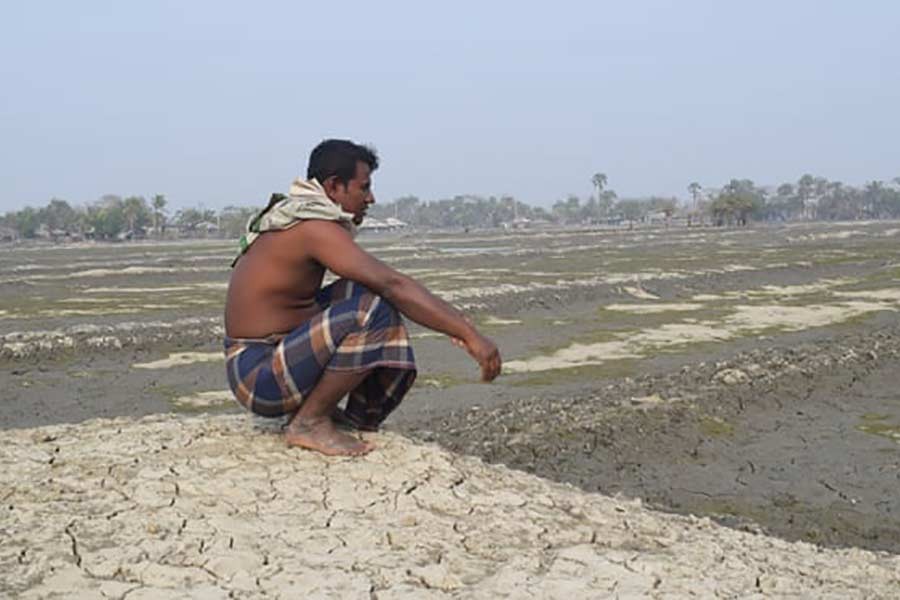Cyclone Amphan, COVID-19 pandemic push shrimp farmers into poverty

Published :
Updated :

This time last year the west coast of Bangladesh was a thriving place for shrimp farmers. It was a decent enough living and there was a healthy export market.
Majnu Sardar, who lives in Koyra upazila (administrative region) in Khulna district, used to earn enough to feed, clothe and educate his family of six. Now they are living in a small mud hut, with a canopy of leaves as a roof, on the banks of the Kapotaksha River after Cyclone Amphan buried his house and land in May, reports The Guardian.
“The shrimp farm was under water for nine months. Three to four feet of silt has accumulated there. Everything on the farm is ruined. Now a lot of money is needed to fix these again. I am now carrying the burden of debt. Where can I get money for shrimp farming?”
Sardar, 35, and his family are “fighting” to eat. Every day he looks for labouring work.
Up to 70 per cent of the 300,000 shrimp farmers in Khulna and the neighbouring districts of Satkhira and Bagerhat ran small businesses, leasing land and selling for export, a trade that ended with the Covid-19 lockdown.
About 80 per cent of export orders for shrimp, worth about $54 million, were cancelled between July and December last year.
The drop in exports saw local shrimp prices more than halve. That came just weeks after Amphan, the fiercest storm to hit the region this century, destroyed boats and equipment.
“This is causing a lot of trouble,” says Sardar. “Last year the Covid-19 virus and cyclone dropped me to zero. I have lost the capital for shrimp farming. I am carrying the burden of debt. I have become a day labourer from a shrimp farmer. I don’t know how it will go in the future.”
Sardar is one of many still in temporary shelters, while others have upped and left for the capital Dhaka in search of work.
Muslima Begum, 36, a shrimp farmer from Koyra upazila, used to earn a living wage, but now she is dependent on any work her husband, Mosharraf Hossain, can find.
“We have never faced such a crisis before,” she says. “I’ve lost about Tk 100,000. I am in debt. Shrimp will not be cultivated this year. I don’t know how the day will go.
“It is now very difficult to provide food for five members of the family. Before, I got nutritious food from the vegetable garden near the house. Everything was destroyed in the cyclone, now everything has to be bought from the market. And [with] the high price of all products in the market, it is not possible for us to buy everything like before.”
Nur Islam, 45, from Assasuni upazila, in Satkhira district, says his business is dead. “I have been making a living by shrimp farming for several years. There are small problems at different times. Losses occur when shrimp farms are infected with a virus. But if one year goes bad, the next year it makes up for the loss again,” he says.
“But this time I was completely finished.”
Farmers have taken out loans or sold off their assets. Islam sold his cow to pay off his arrears to the landowner – and to buy a small boat that he uses to ferry people across the river. He earns up to Tk 300 a day. His family of six now have only two meals a day. His daughter had to be taken out of school because Islam couldn’t afford the fees, and he’s had to stop sending his son money to help him through college.
“I have never imagined that I would have to make a living by selling cows and buying boats.
“I am fighting for my daily life. I am in debt of about Tk 200,000. I don’t know how to repay this loan. I can’t think of a new shrimp farm if I don’t repay the loan. In a few years we were going upwards economically. I’m going down very fast now.’’
Islam hopes the government will step in: “We cannot avoid natural disasters. I hope the good times for my shrimp will come when the epidemic is over … There needs to be government incentives for shrimp farmers to offset the losses. The government has to think of us.”


 For all latest news, follow The Financial Express Google News channel.
For all latest news, follow The Financial Express Google News channel.